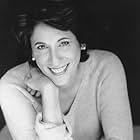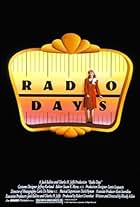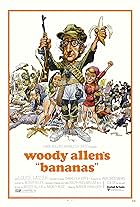IMDb RATING
7.8/10
152K
YOUR RATING
The life of a divorced television writer dating a teenage girl is further complicated when he falls in love with his best friend's mistress.The life of a divorced television writer dating a teenage girl is further complicated when he falls in love with his best friend's mistress.The life of a divorced television writer dating a teenage girl is further complicated when he falls in love with his best friend's mistress.
- Nominated for 2 Oscars
- 16 wins & 24 nominations total
Anne Byrne Hoffman
- Emily
- (as Anne Byrne)
- Director
- Writers
- All cast & crew
- Production, box office & more at IMDbPro
Featured reviews
Let me get this out of the way: I'm a big Woody Allen fan. And this flick is absolutely and utterly his. From the black and white to the ambience and, of course, the dialog, it all screams Woody Allen as loud as it can.
As most of his movies, Woody is not simply playing a character, nor simply being himself. It is a mix, a blend between a real man and a made up persona. And, as always, the line is weirdly blurry, making it so, at times, you're watching a documentary.
The plot itself is not the central point of the story and, at times, it is hard to understand exactly what it is leading to. No, the focus of the story is the characters. Characters like Isaac, Yale and the city. Specially the city. It is an homage to a now distant past of history, viewed from the lens of a troubled mix of a real and fictional man.
It is hard to defend most of Isaac's actions. And it is way harder to get mad at them. It is a movie about imperfection, ego, society, intellectuals and love. And it is great. A great movie to be rewatched as many times as you can.
From a technical standpoint, this film is top-notch - the acting is brilliant, the cinematography is beautiful, and the George Gershwin soundtrack is excellent.
But the content of the film is another thing. Basically, Woody Allen comes across as an egomaniacal creep who writes parts for himself in order to make him look like he's God's gift to women (there are so many references to his sexual prowess one could start a group drinking game based off it).
And anybody with even a beginner's understanding of adolescent psychological development knows that men who pursue teenage girls are sick and sadistic bastards who find joy in ruining promising young lives.
So my summary is: Like the film for its craft, but loathe the creator for his statement.
But the content of the film is another thing. Basically, Woody Allen comes across as an egomaniacal creep who writes parts for himself in order to make him look like he's God's gift to women (there are so many references to his sexual prowess one could start a group drinking game based off it).
And anybody with even a beginner's understanding of adolescent psychological development knows that men who pursue teenage girls are sick and sadistic bastards who find joy in ruining promising young lives.
So my summary is: Like the film for its craft, but loathe the creator for his statement.
Woody Allen started off making outrageous, cheap, hit-and-miss, unpretentious comedies, the best of which were probably "Love and Death" and "Sleeper." The comedy became more rooted in reality and grafted onto an engaging story of lost love in "Annie Hall," which I think is still his best film. After that, "Interiors." Ka-Boom. Since then there have been no more absurd comedies, several gloomy dramas, and many more or less successful attempts to blend comedy with serious themes.
This is one of the dark comedies and didn't work for me. Allen is going with a high-school girl, falls for a woman nearer his own age, alienates his close friend, and finally decides -- too late -- that the younger girl is his soul mate. It ends ambiguously with her leaving for Europe. The plot is out of a soap opera. It does have some witty lines (almost all of them given to Allen himself) and a lot of inside New Yorker intellectual allusions, but, aside from the Gershwin score, isn't worth seeing twice. Really, it's pretty boring. The performances aren't bad, but Allen doesn't challenge himself either. It's his old neurotic, stuttering, put-upon persona that is by now more than familiar enough. There's just nothing new.
It isn't that Allen had run out of ideas by 1979 because he's made some successful films since then -- "Hollywood Ending" and "Broadway Danny Rose", for instance. But "Manhattan" is one of the many that simply got by me. It didn't seem charming. It seemed repetitious and pointless. I didn't bother counting the times someone meets another and says, "Hiii," using the contours of the fourth tone in Mandarin Chinese. And no one seems to say it just once during a given encounter, but several times. "Hii, hii -- how AHH you?"
I kept waiting for one of two things to happen. Either IT takes off or I get drawn in. But neither contingency was realized. I cared about the entanglements in "Annie Hall," but here it didn't matter to me who wound up with whom, and I never got the feeling that it mattered much to Allen either.
This is one of the dark comedies and didn't work for me. Allen is going with a high-school girl, falls for a woman nearer his own age, alienates his close friend, and finally decides -- too late -- that the younger girl is his soul mate. It ends ambiguously with her leaving for Europe. The plot is out of a soap opera. It does have some witty lines (almost all of them given to Allen himself) and a lot of inside New Yorker intellectual allusions, but, aside from the Gershwin score, isn't worth seeing twice. Really, it's pretty boring. The performances aren't bad, but Allen doesn't challenge himself either. It's his old neurotic, stuttering, put-upon persona that is by now more than familiar enough. There's just nothing new.
It isn't that Allen had run out of ideas by 1979 because he's made some successful films since then -- "Hollywood Ending" and "Broadway Danny Rose", for instance. But "Manhattan" is one of the many that simply got by me. It didn't seem charming. It seemed repetitious and pointless. I didn't bother counting the times someone meets another and says, "Hiii," using the contours of the fourth tone in Mandarin Chinese. And no one seems to say it just once during a given encounter, but several times. "Hii, hii -- how AHH you?"
I kept waiting for one of two things to happen. Either IT takes off or I get drawn in. But neither contingency was realized. I cared about the entanglements in "Annie Hall," but here it didn't matter to me who wound up with whom, and I never got the feeling that it mattered much to Allen either.
I watched Manhattan recently because i had never seen Woody Allen's films and heard this was one of his best.
I can see why people love this film, it certainly is quite original and a convincing snapshot of a group of friends in New York, but I found Woody's character just too excruciating self-possessed and irritating to enjoy the film overall.
I guess you either love him or hate him, but he reminded me of George Costanza on Seinfeld - i just wanted to shake him and say 'get over yourself!'.
As for the humor, there were a lot of attempted wit there but nothing that made me laugh out loud. I won't be a hurry to see any of his other films.
I can see why people love this film, it certainly is quite original and a convincing snapshot of a group of friends in New York, but I found Woody's character just too excruciating self-possessed and irritating to enjoy the film overall.
I guess you either love him or hate him, but he reminded me of George Costanza on Seinfeld - i just wanted to shake him and say 'get over yourself!'.
As for the humor, there were a lot of attempted wit there but nothing that made me laugh out loud. I won't be a hurry to see any of his other films.
10tvspace
Manhattan is an exhilarating American romance set against the backdrop of New York of the late 70's: my favorite New York, the New York of painters, poets, punks, and Pauline Kael. Three great, very American talents -- Woody Allen, Gordon Willis, and George Gershwin -- intertwine their respective gifts to create a comedy that manages to satisfy both the brain and the heart, and even, perhaps, the lower regions.
Allen is so brainy and such a nebbish that he can get away with gestures that would be painfully sentimental in the hands of any other director: when he begins the movie with fireworks cut to Gershwin, it isn't to soften you up for a soap opera, but to remind you that however much his neuroses may seem to drive the scenes, its the love of New York that drives the movie.
The entire cast is note perfect: Meryl Streep as his caustic bisexual ex-wife, Diane Keaton as a nervous journalist from Philadelphia, and especially Mariel Hemingway, whose performance as Allen's 17-year old girlfriend is charming, heartbreaking, and wise.
Allen's comedy here is at its absolute finest. The fact that it is interwoven with a genuinely moving love story told with a subtlety and indirection that is unheard of in today's mainstream cinema only makes the laughs that much richer.
Gordon Willis' cinematography is good enough for the Museum of Modern Art. Scene after scene leaves a grin on your face as his moving (in both senses) black and white photography floats across the screen.
And finally underlying everything is the music of George Gershwin, whose exubertant melodies propel the movie forward at every turn.
This is Woody Allen's best movie, a great movie, and an American movie in the best sense. As an homage to the city of New York it will surely remain unsurpassed.
Allen is so brainy and such a nebbish that he can get away with gestures that would be painfully sentimental in the hands of any other director: when he begins the movie with fireworks cut to Gershwin, it isn't to soften you up for a soap opera, but to remind you that however much his neuroses may seem to drive the scenes, its the love of New York that drives the movie.
The entire cast is note perfect: Meryl Streep as his caustic bisexual ex-wife, Diane Keaton as a nervous journalist from Philadelphia, and especially Mariel Hemingway, whose performance as Allen's 17-year old girlfriend is charming, heartbreaking, and wise.
Allen's comedy here is at its absolute finest. The fact that it is interwoven with a genuinely moving love story told with a subtlety and indirection that is unheard of in today's mainstream cinema only makes the laughs that much richer.
Gordon Willis' cinematography is good enough for the Museum of Modern Art. Scene after scene leaves a grin on your face as his moving (in both senses) black and white photography floats across the screen.
And finally underlying everything is the music of George Gershwin, whose exubertant melodies propel the movie forward at every turn.
This is Woody Allen's best movie, a great movie, and an American movie in the best sense. As an homage to the city of New York it will surely remain unsurpassed.
Did you know
- TriviaMeryl Streep shot her scenes during breaks in filming Kramer vs. Kramer (1979).
- GoofsIn the first scene at Elaine's, as Isaac is beginning to say something, two people (presumably customers of the restaurant, as it was running while they were shooting) walk in front of the camera. Isaac laughs, and quickly recovers with an impromptu remark about how his girlfriend has to go and do homework.
- Quotes
Isaac Davis: All the times I come over here, I can't understand how you can prefer her to me.
Jill: You can't understand that?
Isaac Davis: No. It's a mystery to me.
Jill: Well, you knew my history when you married me.
Isaac Davis: I know. My analyst warned me, but you were so beautiful that I got another analyst.
- Crazy creditsOne of the very few Woody Allen films to not have traditional opening credits, save the production company bumper (United Artists), and the film title MANHATTAN is seen as a long vertical flashing bright neon sign, located on the side of a New York City building, and is seen for under seven seconds just before Woody Allen narrates his first line.
- ConnectionsEdited into Intimate Portrait: Diane Keaton (2001)
- SoundtracksRhapsody in Blue
(1924)
Music by George Gershwin
Performed by The New York Philharmonic
Conducted by Zubin Mehta
Piano soloist: Paul Jacobs
Music director: Zubin Mehta
Details
- Release date
- Country of origin
- Language
- Also known as
- Chuyện Tình Manhattan
- Filming locations
- Production company
- See more company credits at IMDbPro
Box office
- Budget
- $9,000,000 (estimated)
- Gross US & Canada
- $39,946,780
- Opening weekend US & Canada
- $485,734
- Apr 29, 1979
- Gross worldwide
- $40,194,067
- Runtime1 hour 36 minutes
- Color
- Sound mix
- Aspect ratio
- 2.39 : 1
Contribute to this page
Suggest an edit or add missing content


































